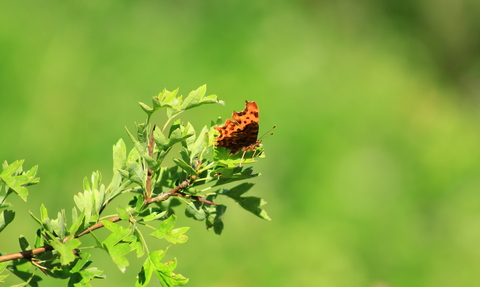
Species and Habitat Action Plans
The Species and Habitat Action Plans
Our 52 action plans were initially compiled by numerous local experts between 2002-2005 and widely consulted amongst conservation specialists and potential partners. Their comments and amendments were incorporated and the plans adopted by the Steering Group. However, it was not intended that the plans should be set in stone and between 2012-15 a review was carried out to update them and make them more achievable and measurable.
One of the results of the review was the creation of generic plans for actions that were common to all the plans: a generic species action plan and generic habitat action plan.
Find out more about the Warwickshire, Coventry and Solihull Local Biodiversity Action Plan (LBAP).
Updating the Action Plans: If you have carried out a project, or know of work, relating to any of the Action Plans listed below please contact:
Gina Rowe
Landscape Recovery Development Manager
Chair of LBAP
Email: gina.rowe@wkwt.org.uk
Much of the information in the habitat plans has been derived from the work of the Habitat Biodiversity Audit:
- Established in 1995 as a partnership between all the Local Authorities within Warwickshire, Coventry and Solihull plus Natural England and Warwickshire Wildlife Trust. Its remit was to survey every field and boundary in the sub-region to provide up-to-date biodiversity data held on a Geographical Information System (GIS), that is updated annually.
- The data are invaluable in protecting and enhancing habitats across the sub-region as the planning authorities use the information for a range of purposes, including spatial planning and development control.
- As the longest continual running survey of its kind, the Phase 1 survey for Warwickshire has become an invaluable research data set for land-use change and landscape enhancements across the region.
- Recognized as European standard of good practice.
The Wildlife Sites Project began in 1999 to develop and maintain a formalized Local Wildlife Sites system for Warwickshire:
- Made up of Wildlife Sites and Local Geological Sites as part of a wider initiative also involving the Local Wildlife Sites system operated in Coventry and Solihull.
- Responsible for site selection in collaboration with the local authorities, and undertakes the detailed site survey generally referred to as a Phase 2 habitat survey against a set of criteria based on the Joint Nature Conservancy Council (JNCC) national criteria for the selection of biological Sites of Special Scientific Interest (SSSI).
- These have been expanded to reflect a local authority’s role in nature conservation including local community characteristics.
Habitat Action Plans
The area of Warwickshire, Coventry and Solihull has been categorised into 6 broad habitat types: grassland, farmland, woodland, urban, post-industrial and wetland. These broad habitats have been sub-divided into 25 Action Plans, the aim being to give a comprehensive cover of all the land area of the sub-region. Those in bold are UK BAP Priority Habitats; the terminology and derivation of the objectives can be viewed here.
- Acid Grassland (updated November 2021)
- Allotments (updated 2021)
- Built Environment (revision in progress 2021)
- Calcareous Grassland (updated November 2021)
- Canals (updated August 2021)
- Churchyards and Cemeteries (updated November 2021)
- Field Margins (updated November2021)
- Gardens (updated 2021)
- Hedgerows (updated November 2021)
- Lakes and Reservoirs (updated 2021)
- Lowland Heathland (updated November 2021)
- Marsh and Swamp, Wet Grassland and Wet Woodland (updated November 2021)
- Mosaic Habitats on Previously Developed Land (updated November 2021)
- Neutral Grassland (updated November 2021)
- Old Parkland and Veteran Trees (updated February 2021)
- Parks and Public Open Spaces (updated November 2021)
- Ponds (revised March 2022)
- Quarries and Gravel Pits (updated November 2021)
- Reed beds (updated March 2022)
- Rivers and Streams (updated February 2018)
- Roadside Verges (updated August 2021)
- Scrub and Carr (now incorporated into other action plans)
- School Grounds (updated August 2021)
- Traditional Orchards (updated November 2021)
- Woodland (updated November 2021)
Progress with Habitat Action Plans 2011-2020
Allotments progress report 2011-2020
Built Environment progress report 2011-2020
Gardens progress report 2011-2020
Lakes & Reservoirs progress report 2011-2020
Progress with Habitat Action Plans 2011-2019
Ponds progress report 2011-2019
Old parkland and veteran trees progress report 2011-2019
Parks and public open spaces progress report 2011-2019 updated 2021
Traditional orchards progress report 2011-2019
Woodland progress report 2011-2019
Progress with Habitat Action Plans 2011 - 2018
Please see reports below:
Canals progress report 2011-2018
Marsh and swamp, wet grassland and wet woodland progress report 2011 - 2018
Reed beds progress report 2011 - 2018
Progress with Habitat Action Plans 2011 - 2017
Please see the reports below:
Calcareous grassland progress report 2011-2017
Open mosaic habitats progress report 2011-2017
Quarries & gravel pits progress report 2011-2017
Progress with Habitat Action Plans 2011 - 2016
Please see the reports below:
Arable field margins progress report 2011-2016
Hedgerows progress report 2011-2016
Neutral Grassland progress report 2011-2016
Rivers & Streams progress report 2011-2016
Progress with Habitat Action Plans 2011 - 2015
Please see the reports below:
Churchyards and cemeteries progress report 2011-2015
Lowland Acid grassland progress report 2011-2015
Lowland Heathland progress report 2011-2015 updated 2021
Roadside verges progress report 2011-2015
School grounds 2016
Species Action Plans
The Steering Group, in consultation with local specialist experts, selected a balance of species across the various groups of animals and plants typical of Warwickshire, Coventry & Solihull. In most instances, this produced action plans for species which are listed as Priority in the UK Steering Group report (i.e. national target species). However, in some cases the populations of those species in this region are increasing or stable and therefore are not in need of current action. In these instances, a more needy local species has been chosen for an action plan instead.
In all, 27 Action Plans for Warwickshire Coventry and Solihull were selected on the basis of the criteria outlined below; those in bold are UK BAP Priority Species:
- UK Steering Group report Listed (as internationally or nationally threatened)
- Keystone species for which management action will benefit a number of associated species
- Cultural value, or locally characteristic. Includes species which are familiar to local people
- Scarcity. Species which are locally/ nationally scarce of declining. Especially if the species “should” be more widespread locally
- Specific action needed over and above general habitat conservation
- In rapid decline locally.
- Adder (updated March 2018)
- Argent & Sable Moth (updated November 2021)
- Barn owl (updated April 2022)
- Bats (revised March 2022)
- Bittern (updated March 2022)
- Black Poplar (updated December 2021)
- Bloody-Nosed Beetle (updated November 2018)
- Chalk Carpet Moth (updated November 2021)
- Common Dormouse (updated December 2021)
- Cuckoo Bee (updated March 2018)
- Dingy Skipper (updated November 2021)
- Dotted Bee-Fly (updated November 2021)
- Farmland Birds (updated August 2021)
- Fish (in-prep)
- Great Crested Newt (revised March 2022)
- Hedgehog (updated 2021)
- Lapwing (updated May 2017, will be superceded by Wading Birds in 2022)
- Leaf-Rolling Weevil (updated February 2021)
- Otter (updated December 2021)
- Rare Bumblebees (updated December 2021)
- Red Wood Ant (update in progress 2021)
- Scarce Arable Plants (updated December 2021)
- Small Blue Butterfly (updated November 2021)
- Snipe (updated April 2019, will be superceded by Wading Birds in 2022)
- Song Thrush (updated 2021)
- Wading birds (in-prep for 2022)
- Water Vole (updated December 2021)
- White-Clawed Crayfish (updated April 2022)
- Wood White Butterfly (updated November 2021)
Progress with Species Action Plans 2011-2020
Hedgehog progress report 2011-2020
Song Thrush progress report 2011-2020
Progress with Species Action Plans 2011-2019
Great crested newt progress report 2011-2019
Common dormouse progress report 2011-2019
Argent & sable progress report 2011-2019
Leaf-rolling weevil progress report 2011-2019
Red wood ant progress report 2011-2019
Wood white butterfly progress report 2011-2019
Progress with Species Action Plans 2011-2018
Please see reports below:
Bittern progress report 2011 - 2018
Black poplar progress report
Bloody nosed beetle progress report 2011-2018
Otter progress report 2018
Snipe progress report 2018
Water vole progress report 2011-2018
Progress with Species Action Plans 2011-2017
Please see reports below:
Adder progress report 2011 - 2017
Chalk Carpet Moth progress report 2011 - 2017
Cuckoo bee progress report 2011 - 2017
Dotted Bee-fly progress report 2011 - 2017
Small blue butterfly progress report 2011-2017
Progress with Species Action Plans 2011 - 2016
Please see reports below:
Farmland Birds progress report 2011-2016
Lapwing progress report 2011-2016
Scarce Arable Plants progress report 2011-2016
Rare Bumblebees progress report 2011-2016
White-clawed Crayfish progress report 2011-2016
Progress with Species Action Plans 2011-2015
Please see reports below.
